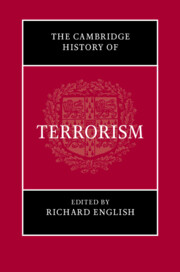Book contents
- The Cambridge History of Terrorism
- The Cambridge History of Terrorism
- Copyright page
- Contents
- Figures
- Tables
- Acknowledgements
- Contributors
- Part I Introduction
- Part II Frameworks and Definitions
- Part III Historical Case Studies in Terrorism
- 7 Terrorism in Israel/Palestine
- 8 Terrorism in the Basque Country
- 9 Terrorism in African History
- 10 The History of Terrorism in Pakistan
- 11 Political Violence in Ireland
- 12 Terrorism in the Russian Empire
- 13 Terrorism in Post-Soviet Russia
- 14 Terrorism in the Netherlands
- 15 Terrorism: An American Story
- 16 Political Violence and Terrorism in Colombia
- 17 The Paths of Terrorism in Peru
- 18 Aiqtihams (Whirlwind Attacks)
- 19 Transnational Connections
- Part IV Thematic Essays
- Part V Conclusion
- Index
- References
17 - The Paths of Terrorism in Peru
Nineteenth to Twenty-First Centuries*
from Part III - Historical Case Studies in Terrorism
Published online by Cambridge University Press: 07 May 2021
- The Cambridge History of Terrorism
- The Cambridge History of Terrorism
- Copyright page
- Contents
- Figures
- Tables
- Acknowledgements
- Contributors
- Part I Introduction
- Part II Frameworks and Definitions
- Part III Historical Case Studies in Terrorism
- 7 Terrorism in Israel/Palestine
- 8 Terrorism in the Basque Country
- 9 Terrorism in African History
- 10 The History of Terrorism in Pakistan
- 11 Political Violence in Ireland
- 12 Terrorism in the Russian Empire
- 13 Terrorism in Post-Soviet Russia
- 14 Terrorism in the Netherlands
- 15 Terrorism: An American Story
- 16 Political Violence and Terrorism in Colombia
- 17 The Paths of Terrorism in Peru
- 18 Aiqtihams (Whirlwind Attacks)
- 19 Transnational Connections
- Part IV Thematic Essays
- Part V Conclusion
- Index
- References
Summary
In Peru, the term ‘terrorism’ is unequivocally linked to the Communist Party of Peru-Sendero Luminoso (PCP-SL), best known in English as the Shining Path. The PCP-SL took up arms in 1980 to unleash the bloodiest and most lengthy insurgency recorded in Peru’s modern history. The ‘time of terrorism’ refers to the years from 1980 to approximately 1998, in which Sendero launched their so-called ‘people’s war’ (guerra popular) with the ultimate goal of taking over the state and establishing the ‘dictatorship of the proletariat’. Because of their systematic attack on all forms of organised society, some have described SL as the opposite of a social movement. Others have likened it to Cambodia’s Khmer Rouge, in the light of their authoritarian ideology and methods, and their agrarian-based self-sufficient communist utopia. Today, the scars of the war are likely to be unnoticed by foreign visitors and a younger generation of Peruvians. A celebratory mood has taken over since the first decade of the twentieth century, making references to the recent past of political violence an uncomfortable truth that many have preferred not to look at. But this national celebratory mood belies scars of violence that run deep. Terrorism has a history, which should not be detached from the history of terrorism, the term. It is the awareness of this history that will free us from reproducing the state’s repressive gaze and to embrace our citizenship.
Information
- Type
- Chapter
- Information
- The Cambridge History of Terrorism , pp. 420 - 452Publisher: Cambridge University PressPrint publication year: 2021
References
Further Reading
Accessibility standard: Unknown
Why this information is here
This section outlines the accessibility features of this content - including support for screen readers, full keyboard navigation and high-contrast display options. This may not be relevant for you.Accessibility Information
- 3
- Cited by
